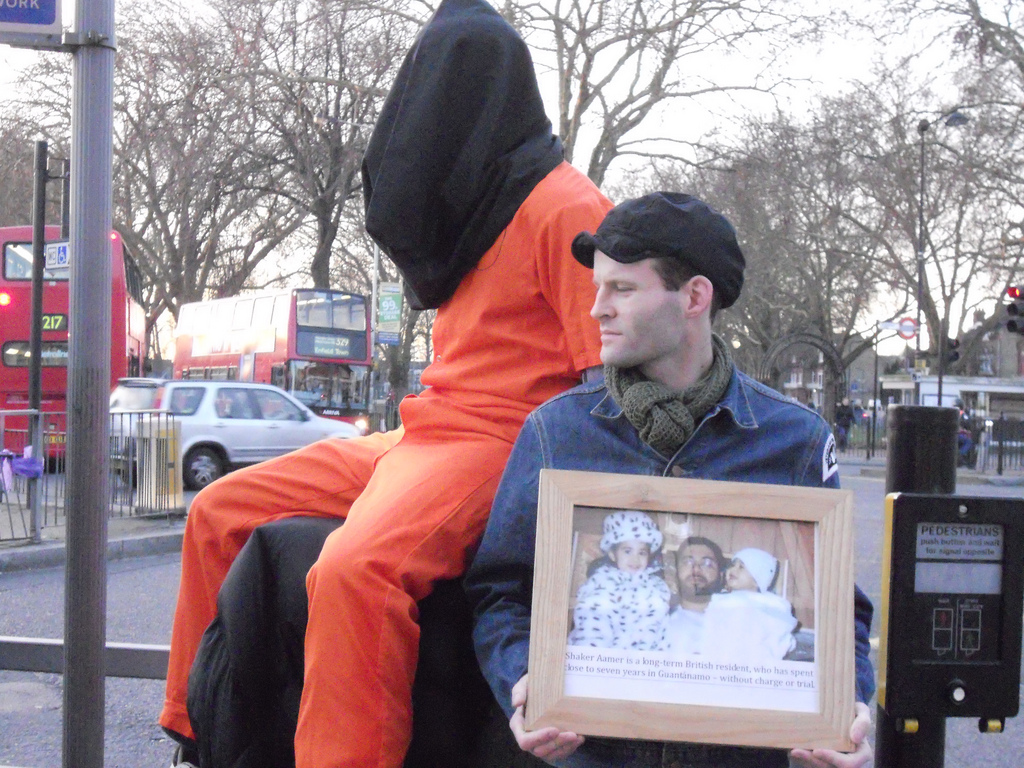The Guantánamos Next Door
Jean Casella and James Ridgeway, solitarywatch.com, 11 January 2012
Guantánamo Bay turns 10 today, and activists
are marking the anniversary with
protests and
petitions,
reports and
retrospectives. A decade after its founding, Guantánamo remains a
dark stain on the national soul.
Even today, while the worst
instances of torture may have ceased under the Obama Administration,
prisoners are still subjected to solitary confinement and other forms of
deprivation and abuse. According to a February 2009 report from the
Center of Constitutional Rights: “The descriptions of ongoing,
severe solitary confinement, other forms of psychological abuse,
incidents of violence and the threat of violence from guards, religious
abuse, and widespread forced tube-feeding of hunger strikers indicate
that the inhumane practices of the Bush Administration persist today at
Guantánamo.”
Then there’s the fact that the prisoners at Guantánamo have been
deprived of their liberty without any semblance of due process. Over the
last decade, 779 prisoners have been held at Gitmo; 171 remain. Only six
have ever been convicted of a crime.
When it comes to depriving people of their human and civil rights,
Guantánamo stands as an unprecedented extreme. But it is far from the
only place where these things happen. Today, in our cities and towns, in
every state in America, there are places where individuals are
incarcerated without trial, and where they suffer deprivation and abuse.
They are our local jails.
Take the issue of pre-trial detention. According to the
Pre-Trial Justice Institute, a full 61% of U.S. jail inmates–nearly
half a million in all–have not yet been convicted of any crime. Many
have not even been accused of a violent crime. The majority of
them are in jail because they cannot afford the modest bail required for
their release. A
2010 study by Human Rights Watch looked at defendants in New York
City arrested on nonfelony charges. ”Most were accused of nonviolent
minor crimes such as shoplifting, turnstile jumping, smoking marijuana
in public, drug possession, trespassing, and prostitution.” It found
that “87 percent were incarcerated because they were unable to post the
bail amount at their arraignment,” even though bail had been set at
$1,000. These defendants faced weeks, months, or years in pre-trial
confinement for no reason other than poverty.
While awaiting trial, these individuals face appallingly
overcrowded conditions,
inadequate food–and far worse. On New York City’s
Rikers Island, nearly one in twelve prisoners is held in solitary
confinement at any given time; the jail maintains two isolation units
specifically for inmates with mental illness, and another for juveniles.
Pre-trial solitary is routinely used on underaged inmates, to separate
from the adult jail population;
one report out of Texas found juveniles in the Harris County Jail
spending a year or more in complete isolation. In the most extreme
cases–such as that of
Syed Fahad Hashmi, pre-trial detainees are held under “Special
Administrative Measures” that constitute acute sensory deprivation.
Solitary confinement is not the only form of torment that detainees face
in local jails. A
recent report by the ACLU’s National Prison Project showed a pattern
of brutal abuse, carried out by sheriff’s deputies, in the Los Angeles
County jail system: “In the past year, deputies have assaulted scores of
non-resisting inmates…Deputies have attacked inmates for complaining
about property missing from their cells. They have beaten inmates for
asking for medical treatment, for the nature of their alleged offenses,
and for the color of their skin. They have beaten inmates in
wheelchairs. They have beaten an inmate, paraded him naked down a jail
module, and placed him in a cell to be sexually assaulted. Many attacks
are unprovoked. Nearly all go unpunished: these acts of violence are
covered up by a department that refuses to acknowledge the pervasiveness
of deputy violence in the jail system.”
“America’s criminal justice system has deteriorated to the point that it
is a national disgrace,” said Senator Jim Webb, using a phrase that has
often been applied to Guantánamo Bay. But just as it has thwarted any
attempts to close Gitmo, the U.S. Congress has
blocked all of Webb’s attempts to propel the kinds of domestic
criminal justice reforms that might have kept local jails from remaining
Gitmos in our own backyards.
SOURCE: http://solitarywatch.com/2012/01/11/the-guantanamos-next-door/
In London, UK:

On the 10th. anniversary of the opening of Guantanamo (Jan 11th, 2012), folks from Veterans for Peace, No Borders, Harringey Solidarity Group and Giuseppe Conlon Catholic Worker House gathered in Harringey, London to demand the immediate closure of Guantanamo and other U.S. gulags. Our gathering included three former prisoners and Ben Griffin, a British veteran of the wars on Iraq and Afghanistan (pictured above, with the black cap). We made a specific call for the release of Londoner Shaker Aamer. You can see more photos of the protest here.